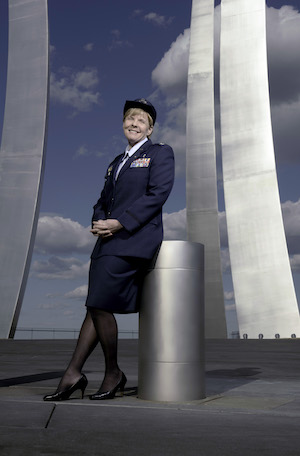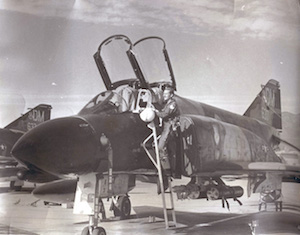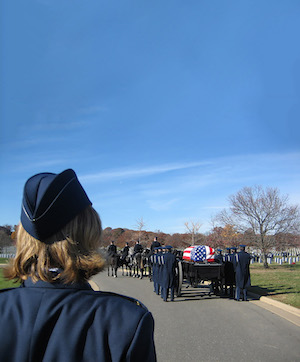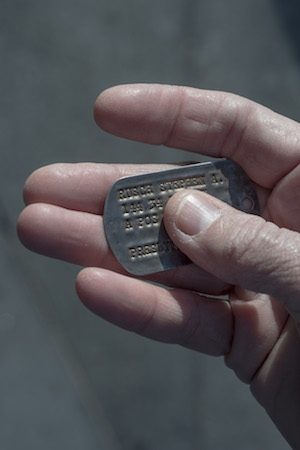FEATURES
Lives of Service
The Senate has Confirmed Alumna Sharon Bannister to be the Top-Ranked Dentist in the U.S. Air Force, Where She's Making a Difference and Feeling Closer to the Father She Hardly Knew
 PHOTO: David Colwell
PHOTO: David ColwellAt the Air Force Memorial in Arlington, Virginia, three stainless steel spires rise into the sky as a symbol of the missing man formation. Alumna Sharon Bannister regularly visits the hilltop memorial—which overlooks the Pentagon and Arlington National Cemetery, and often hosts Air Force Band concerts—to remember, honor and celebrate service members.
Two teeth were all that remained—a molar and a premolar, each with a silver filling.
Sharon Bannister, DDS (DEN '92), a dentist and U.S Air Force colonel, knew that to identify people through dental records, three points of similarity on a recovered tooth must match their X-rays.
No doubts clouded her mind that day in 2007 as she looked at the evidence. What others had already determined was true: The teeth belonged to her dad.
Her eyes filled with tears.
"I thought, wow, he's really home," she recalled. "For the first time, I knew what happened to him."
Stephen Rusch hadn't been stateside since 1971, when he last kissed Sharon, who was 5, and her younger sister, Rebecca, before departing for Vietnam. Less than a year later, his F-4E Phantom II fighter bomber was shot down over Laos, and he was never heard from again.
Bannister didn't join the military because of her father. But throughout a career that reached new heights in January—when the U.S. Senate confirmed her to be a brigadier general and the top-ranked dentist in the Air Force—he's been the reason she's stayed.
"My dad died in his 20s," she said. "So many of the airmen, soldiers, sailors and Marines we're treating now are his age or younger. I think about my dad all the time. If he had made it through the crash, who would have been there to help him? I want to make sure I'm making a difference in people's lives."
Being there for others—even when, or perhaps because, her father couldn't be there for her—has been the defining philosophy of Bannister's 26-year career. She has carried it with her as a commander of healthcare units deployed around the globe, a colonel meeting the remains of fallen service members arriving back on U.S. soil, and a clinician providing the kind of one-on-one care that drew her to dentistry in the first place.
This summer, Bannister, 52, is slated to take on her new post, which includes becoming assistant surgeon general for the Air Force Dental Service. She'll bring her intelligence, empathy and commitment to the work of overseeing roughly 1,000 dentists—plus support staff —around the world who care for service members and conduct dental research.
"Being in the military is ... about being part of something bigger than yourself," she said. "You're part of a mission. You realize what you do is bigger than taking care of a tooth."
MISSING DAD
 PHOTO: The Rusch Family
PHOTO: The Rusch FamilySharon Bannister's father, Stephen Rusch, was a weapons-system operator and flew bombing missions in Vietnam. In 1972, his plane was shot down over Laos, and for decades his fate remained a mystery.
Bannister was born at Keesler Air Force Base in Biloxi, Mississippi, part of the itinerant world of military families. After a move to Puerto Rico, Rusch helped teach his daughters to swim, and Sharon to ride a bike.
The summer before her father left for Vietnam, Sharon captured some of the few memories she has of him.
"I remember him playing guitar," she said. "He was very free-spirited. He loved the outdoors, loved music, loved to travel."
Rusch was sent to Da Nang Air Base in Vietnam. He was a weapons-system operator and flew bombing missions twice each day. On March 7, 1972, he climbed into the back seat of a plane dubbed Gunfighter 61. The flight leader of a companion aircraft later observed enemy ground fire followed by a large explosion.
Sharon's mother, Judy, was at work in Louisville, Kentucky, when two men in uniform showed up to tell her that Rusch—her friend and ex-husband—was missing, so that she could tell their daughters.
She waited four days to break the news to her girls, until after Sharon's sixth birthday party.
Bannister doesn't remember that conversation, and said her family had precious few about her father during her childhood.
"I think the unknown of where he was made discussions a little uncomfortable," Bannister said.
Instead, they went about their daily lives outside Chicago; Judy, a single mother and information-technology executive, and her daughters, who grew up taking pride in her perseverance. Rusch was listed as missing in action for seven years before his status was changed to killed in action. Even then, his family didn't know what had happened.
"I missed having a dad, but I think the strength and independence we got [from our mom] was probably why we've been overachievers," Bannister said.
A LIFE OF SERVICE
 PHOTO: The Rusch Family
PHOTO: The Rusch FamilySharon Bannister watched as her father, Capt. Stephen Rusch, received full military honors during his 2007 burial at Arlington National Cemetery in Virginia.
When Sharon was in fifth grade, doctors discovered a benign tumor in her pelvic bone. The resulting surgery left her bedridden for months, but also sparked an interest in health care.
She attended Miami University in Ohio, majored in chemistry and felt drawn to dentistry by the prospect of caring, chair-side time with patients.
Bannister chose Case Western Reserve School of Dental Medicine for its stellar reputation, and soon found herself working with patients who became like family.
"I loved the feeling of someone coming into the [dental] clinic in pain and leaving with a smile," she said. "I knew the care I was providing made an immediate difference."
She joined the Air Force mainly to take advantage of its highly regarded advanced residency in general dentistry—and after receiving a strong push from one of her dental school clinical instructors who was a retired Air Force colonel.
From the beginning, Bannister felt a connection to the military—and her father—that continually surprised her. At a dinner marking the end of officer training school for medical personnel in San Antonio, Texas, a two-star general approached her.
"He kept looking at me funny from across the room," she said. "He finally came over and said, 'Captain, what's your last name?' I said, 'Rusch.' He said, 'R-u-s-c-h?' I flew with your dad. I recognize you from pictures when you couldn't have been older than 6.'...I thought, how cool is it to be part of an organization where a person who's never met me recognizes me 20 years later from a childhood photo he saw during a deployment in Vietnam?"
In the Air Force, Bannister served as a general dental officer and then as a periodontist, working both state-side and in the Azores, Saudi Arabia and Kyrgyzstan.
A leadership track hadn't been her goal. But when she became commander of the 6th Dental Squadron at MacDill Air Force Base in Tampa, Florida, in 2007, Bannister thrived.
"She's great with critical-thinking skills, but she's also loaded with emotional intelligence," said Gen. Tom Hobbins, who met Bannister in the mid-1990s when she was a young captain performing dental work on him. "She never rules through fear. She's down-to-earth the way she relates to people on a very individual basis."
During the deployment in Kyrgyzstan, Bannister commanded the base's physicians, dentists, nurses and technicians, who cared for personnel from all the military services.
Team members also assisted a country-wide campaign that dewormed more than 3 million people and helped improve the public health of the nation, something Bannister called "an unanticipated highlight of my career."
They visited local orphanages and schools to teach personal hygiene and spent time at clinics, including a children's cancer center. While the purpose was to build relationships with the staffs, Bannister felt drawn to the young cancer patients. "Over time, they would recognize me and reach up and want me to hold them," she said.
That natural warmth and tenderness is one of the reasons Army Col. Jack Jensen (now retired from the military and working at the U.S. Department of Treasury) was so impressed by Bannister when they met.
"I've gotten to see the effect she has on airmen, peers, superiors and subordinates," said Jensen, now her husband. "She cares about them all equally. I recognize her as one of the best leaders I've ever seen, and this is coming from a Green Beret."
Bannister also is a devoted mother of two teenagers influenced by their family's commitment to service. Kira, 17, is secretary-general of the Model United Nations at her high school, and Haley, 15, is in her high school's Junior ROTC program.
In 2015, Bannister took command of the 79th Medical Wing at Joint Base Andrews in Maryland, where she led 1,550 Air Force professionals who provided health-care services to military members around the world and at major national events, including President Donald Trump's inauguration.
When Bannister assumes her new role this summer, it will be the first time a woman has held the post.
"For me, being the first of something is good because then it's not talked about anymore," she said. "I hope to not be looked at as the first woman Dental Corps chief, but rather as the most qualified person for the position who also happens to be a woman."
RETURNING HOME
 PHOTO: DAVID COLWELL
PHOTO: DAVID COLWELLAlumna Sharon Bannister spent decades wondering what happened to her father, a U.S. Air Force weapon-systems operator, whose plane was shot down during the Vietnam War. Now she carries his beat-up dog tag in the pocket of her own military uniform.
Perhaps Bannister's most gratifying assignment was from 2009 to 2012, when she served as commander of the medical group at Dover Air Force Base in Delaware, where all U.S. military casualties from overseas are flown. Every time a plane lands with a fallen service member, a colonel is present to ensure a dignified transfer back to American soil. Bannister often volunteered for this solemn assignment.
"I feel strongly that how we bring home our fallen heroes defines us as a country," she said. "Most of the time, the family was there. That was really hard for me, but for them, I knew the healing would start the moment they saw the flag-draped casket."
Bannister had to wait until 2007—more than 30 years—to begin her own emotional healing. That's when the last traces of her father—recovered in a small southern Laotian town by a joint U.S./Laos team—were shown to her at Hickam Air Force Base in Honolulu. She watched military personnel put a small bag with the teeth inside a gray wool blanket and place it in a casket beneath a blue uniform, adorned with her father's name and medals.
"It was the first time his death was real to me," she said. "You go through your whole life not really knowing. ... It gave me a sense of peace. I realized he was never a prisoner of war, otherwise his teeth wouldn't be at the crash site."
Bannister was assigned to travel with her dad's remains on a commercial flight and then to his final resting place at Arlington National Cemetery.
On a sunny but frigid November day, Capt. Stephen Rusch was transported by a horse-drawn caisson and buried with full military honors, including a 21-gun salute and fighter jet flyover.
A decade later, as Bannister prepares for one of the most prestigious leadership positions in the Air Force health-care system, her father—and the mission they both dedicated their lives to—remains at the forefront of her mind.
"He's my hero," said Bannister, who carries his beat-up dog tag in a pocket of her uniform. "Every day I try to make him proud. I feel like everybody that I'm helping now is somebody that would have been just like my dad. There's no better job than serving those willing to give so much for other people."
 PHOTO: Josh Letchworth/Red Bull Content Pool
PHOTO: Josh Letchworth/Red Bull Content PoolRebecca Rusch rode along the Ho Chi Minh Trail during the feature film project Blood Road in Vietnam, Laos and Cambodia in 2015
Sharon Bannister's younger sister, Rebecca, forged her own path to find their father, Capt. Stephen Rusch, a weapons-systems operator who died in 1972 when his plane was shot down in Laos.
An adventure athlete, Rebecca Rusch biked 1,200 grueling miles of the Ho Chi Minh Trail in Southeast Asia in 2015, making her first visit to their father's crash site, which already had been identified by the U.S. Department of Defense.
The journey was captured in Blood Road, a documentary released last year and screened around the world. It was featured in Sports Illustrated and Rusch wrote about it for The New York Times.
The film tracked Rusch and her Vietnamese riding partner, Huyen Nguyen, as they traveled through dense jungle and waterlogged caves to reach the crash site. It also features several letters her father sent to his family, including one containing a final, foreboding line.
"If anything should happen to me, please don't let me die to Sharon and Becky," he wrote.
He didn't.
When Rusch and the crew reached the small southern Laotian town where the crash occurred, the village chief told her that his father buried her father near a tree that still stands.
There, Rusch left her dad a letter and his missing-in-action bracelet, which she long held close.
"He wasn't missing to me anymore," she said. "As different as Sharon and [my] career paths are, we both found a way to connect with our dad. He's guiding both of us. Sharon knew it earlier than I did; I recently found it out."
Bannister joined her sister at the crash site, but off-camera. She too left a written message.
"[I] said there wasn't a day that passes I don't think about how his short life has made me who I am today," she said. "Through all of this, I've realized it's the memories of those who have given their all that impact those who are still alive and make the world a better place."
The film was produced by Red Bull Media House.





